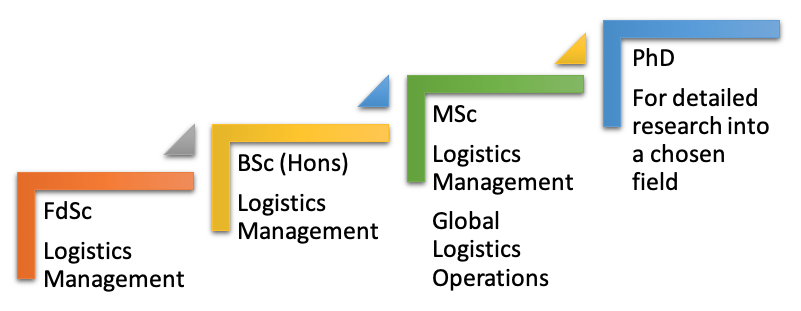The need to professionalise the logistics sector and build a development stairway will not be news to any regular reader of the Focus magazine. Yet, it is still hard to show many working professional stairways making real impact on logisticians and their organisations. This editorial explores one proven model and its impact.
Over the last 10 years the University of Lincoln has been working on the achievement of supporting learners in the logistics sector, their professionalization and recognition of their previous learning and logistics experience. Working with a focus on work based learning the University has developed a number of distant learning programmes for logisticians to apply their practice and offer academic development applied to their logistics role.
To support the stairway approach the University of Lincoln acknowledges student professional study at level 4-7. Each student, depending on their role and experience, will develop their own learning journey. For the novice logistics manager the first step on the stair will be the Foundation Degree which will take them through an introduction to management and supply chain tools applied to their own workplace. Those with more experience and senior roles will be signposted to the “top up” year of a BSc which will allow students to practice supply chain management and leadership. Students can then access the MSc in logistics Management or Logistics Global Operations aimed at the future senior logistics leader. Finally students can then join the University of Lincoln doctoral school to examine their chosen field in the greatest of detail.
This stairway has proven successful with over 500 students completing the undergraduate courses and in excess of 350 on the MSc programmes. The success of this stairway can be seen in its emphasis on the application of theory to practice in the logistics workplace. This is seen both as a positive learning environment by the student but also as a way to make a real difference to their organisation. It is interesting to see the emphasis placed by students on taking their ideas back to the shop floor for implementation. The second half of the success has been identified as the flexibility in the learning journey. Rather than be held to academically imposed deadlines University of Lincoln students have the ability to call on interruption time which allows students to take breaks from learning in their busy periods. One student working for Amazon was supported through the Christmas rush with an agreed change of plan leaving them able to focus on their work and their well-deserved holiday.
The recognition of the success of any professional programme should be seen through the eyes of both the student and the employer. In the last student survey of the MSc programmes, logistics teaching was judged as mainly excellent or good by senior logistics practitioners. From an employer view the University of Lincoln is proud of its partnership with employers such as the MoD both for the learning and teaching in military logistics schools but also for the development and continued delivery of the Defence Logistics Staff Course. The stairway is constructed of three qualifications.
FdSc Logistic Management
This programme is aimed at novice logistic managers and covers levels 4 and 5. It offers them initial learning in both the core skills of leadership and Logistics. Many managers will be offered exemptions from the level 4 study.
BSc (Hons) Logistic Management
This is aimed at the more experienced logistics manager who may wish to turn their work experience and practice into a qualification to gain more professional recognition. Typically a manager will come with professional membership and join the programme in the final level of the degree, level 6. During their study they can develop their own learning through a selection of a range of role and logistics functions modules.
MSc Logistic Management and MSc Logistics Global Operations
These programmes look towards developing the senior logistics managers of the future. This study at level 7 allows student to bespoke their learning through the choice of elective modules. Many students who leave these programmes take up management positions within the supply chain.

